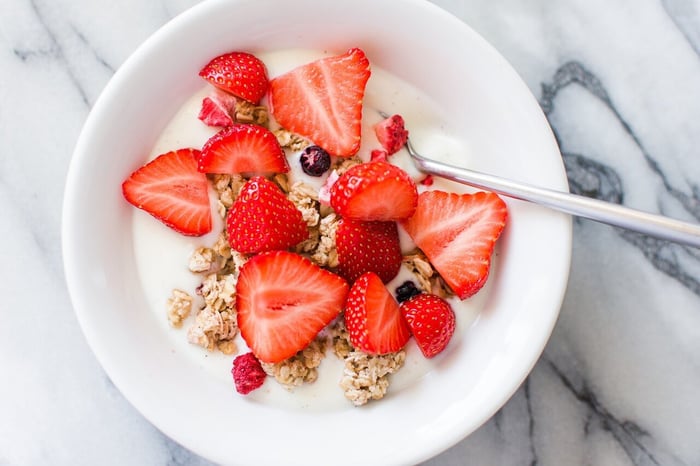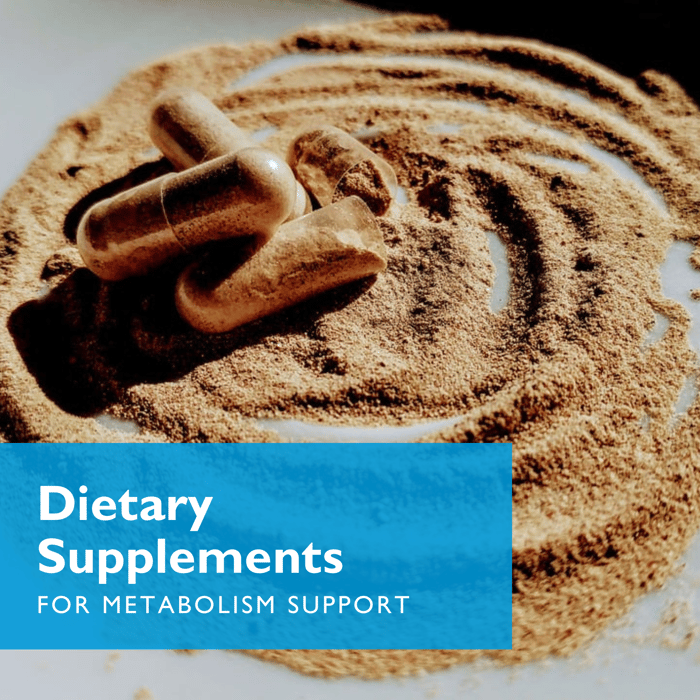Vitamin B12 for Energy: Staying Energetic During the Winter Months
 Dr. Samantha Stavola-Giaconia DCN, RDN, LD, FAND
Lifestyle
Dr. Samantha Stavola-Giaconia DCN, RDN, LD, FAND
Lifestyle
November 6th, 2024

As winter rolls in, many of us may notice a shift in our energy levels. The shorter days, colder temperatures, and sometimes gloomy weather can leave us feeling more fatigued than usual. While factors like lack of sunlight and physical activity play a role, one crucial element that can significantly impact our energy levels during the winter is vitamin B12. Ensuring adequate vitamin B12 intake can help boost energy levels during the winter months. In this blog, we’ll explore the importance of vitamin B12, its relationship with energy, and how to ensure you’re getting enough of this vital nutrient during the winter months through food and dietary supplements.

What is Vitamin B12?
Vitamin B12, also known as cobalamin, is a water-soluble vitamin essential for several key bodily functions. These b vitamins play a pivotal role in:
Red Blood Cell Formation: B12 is crucial for producing red blood cells, which transport oxygen throughout the body. Adequate oxygen levels are vital for maintaining energy.
Nervous System Health: This vitamin is involved in the maintenance of myelin, a protective sheath that surrounds nerves. Proper nerve function is essential for overall bodily coordination and energy levels.
DNA Synthesis: B12 is necessary for the creation of DNA, the genetic material in all cells, influencing growth, repair, and energy metabolism.
Given these roles, it’s clear that adequate B12 levels are critical for maintaining energy and vitality, especially during the winter months when energy levels may naturally dip. Clinical evidence supports the importance of adequate B12 levels, showing that proper nutrient intake can prevent deficiencies and improve physiological and cognitive functions.
The Role of B Vitamins in Energy Production
B vitamins are essential players in the body’s energy production process. These vitamins, including thiamine (B1), riboflavin (B2), niacin (B3), pantothenic acid (B5), vitamin B6, biotin (B7), and vitamin B12, work together to convert the food we eat into usable energy. Each B vitamin has a unique role in this intricate process.
Vitamin B12 stands out for its critical function in the production of red blood cells, which are responsible for transporting oxygen throughout the body. Without sufficient oxygen, our tissues can’t produce the energy needed to keep us active and alert. A deficiency in vitamin B12 can lead to anemia, characterized by fatigue, weakness, and shortness of breath.
Other B vitamins are equally important. Thiamine helps convert carbohydrates into energy, riboflavin aids in the production of ATP from fatty acids, and niacin is crucial for the creation of NAD and NADP, molecules essential for cellular energy production. When any of these vitamins are lacking, it can result in decreased energy levels and overall vitality.
In summary, the B vitamins, particularly vitamin B12, are indispensable for maintaining energy levels. Ensuring an adequate intake of these vitamins can help prevent fatigue and support overall health, especially during the energy-sapping winter months.
Symptoms of Vitamin B12 Deficiency
Before diving into how to boost your B12 intake, it’s essential to recognize the signs of deficiency. Symptoms may include:
Fatigue and weakness
Anemia
Nerve problems (numbness or tingling)
Difficulty walking
Memory issues
Mood changes, including depression or irritability
Vitamin B12 deficiency can also impact mental health, leading to issues such as anxiety and depression.
If you’re experiencing these symptoms, particularly in the winter months, it might be worth discussing B12 levels with a healthcare professional.

The Link Between Vitamin B12 and Energy
When we feel drained during the winter, it can be tempting to chalk it up to seasonal affective disorder (SAD) or simply the effects of cold weather. However, vitamin B12’s role in energy metabolism cannot be overlooked. It helps convert the food we eat into glucose, which the body uses for energy. Without sufficient B12, this process can become inefficient, leading to feelings of fatigue and sluggishness. Supplementing with vitamin B12 can provide an energy boost, helping to alleviate these feelings and improve overall vitality.
Sources of Vitamin B12
Vitamin B12, also known as cobalamin, is an essential nutrient that plays a crucial role in various bodily functions, including DNA synthesis, red blood cell formation, and neurological function. It is naturally found in animal products such as meat, fish, poultry, eggs, and dairy. For those following a vegetarian or vegan diet, fortified foods and supplements are important sources of vitamin B12 to prevent deficiency.
Folic acid, another B vitamin, works alongside vitamin B12 to support various health outcomes, including cardiovascular health.
1. Animal Products

Vitamin B12 is primarily found in animal-derived foods. Here are some excellent sources:
Meat: Beef, lamb, and poultry
Fish and Shellfish: Salmon, trout, tuna, and clams
Dairy Products: Milk, yogurt, and cheese
Eggs
2. Fortified Foods

For those who follow a vegetarian or vegan diet, getting enough B12 can be challenging. Thankfully, many foods are fortified with B12, such as:
- Breakfast cereals
- Plant-based milks (like almond, soy, and oat)
- Nutritional yeast
3. Dietary Supplements
 If dietary sources are insufficient, particularly in the winter months when fresh produce may be less available, consider B12 supplements. Available in various forms—tablets, sublingual, or injections—they can help you maintain optimal levels.
If dietary sources are insufficient, particularly in the winter months when fresh produce may be less available, consider B12 supplements. Available in various forms—tablets, sublingual, or injections—they can help you maintain optimal levels.
Why Winter Might Affect B12 Levels and Mental Health
Dietary Changes: People may consume less fresh produce and fewer high-protein foods in winter, affecting their B12 intake. Maintaining adequate B12 levels is also important for cardiovascular health, as it can influence homocysteine levels and potentially impact cardiovascular disease risk.
Less Sunlight: Vitamin D deficiency is common in winter due to reduced sunlight exposure. Since both vitamins are essential for energy metabolism, a lack of sunlight may exacerbate fatigue.
Increased Stress: The holiday season and winter blues can lead to increased stress levels, which can impact overall health and nutrient absorption.
Groups at Risk of Vitamin B12 Inadequacy
Certain groups of people are at a higher risk of vitamin B12 inadequacy, making it crucial for them to monitor their intake closely. These groups include:
Older Adults: As we age, our bodies become less efficient at absorbing vitamin B12 from food. This decreased absorption can lead to a higher risk of deficiency, making it important for older adults to consider dietary supplements or fortified foods.
Vegetarians and Vegans: Since vitamin B12 is primarily found in animal products, those following a vegetarian or vegan diet may struggle to get enough of this nutrient. Fortified foods and vitamin supplements can help bridge this gap.
People with Gastrointestinal Disorders: Conditions like celiac disease and Crohn’s disease can impair the absorption of vitamin B12, increasing the risk of deficiency. Individuals with these disorders should work with their healthcare provider to manage their B12 levels.
People Taking Certain Medications: Medications such as proton pump inhibitors and histamine 2-receptor antagonists can interfere with the absorption of vitamin B12. If you are on these medications, it’s important to discuss your B12 status with your doctor.
People with Pernicious Anemia: This condition prevents the body from absorbing vitamin B12 from food, leading to a deficiency. Those diagnosed with pernicious anemia will need regular B12 injections or high-dose oral supplements to maintain adequate levels.
Awareness of these risk factors is the first step in preventing vitamin B12 deficiency. If you belong to any of these groups, consider discussing your B12 intake with a healthcare provider to determine the best course of action, whether through diet adjustments or vitamin supplements.
Tips for Boosting Vitamin B12 Intake
Here are some practical tips to ensure you’re getting enough B12 during the winter:
1. Incorporate B12-Rich Foods: Make an effort to include meat, fish, eggs, and dairy in your meals. For vegetarians and vegans, fortified foods and nutritional yeast are great options.
2. Consider Supplements: If you're unsure about your dietary intake or have symptoms of deficiency, talk to your doctor about starting a B12 supplement.
3. Stay Active: Regular physical activity can help combat winter fatigue. Even a short walk outside can help improve your mood and energy levels.
4. Manage Stress: Techniques such as mindfulness, yoga, and regular social interactions can help reduce stress levels, positively impacting your overall health and energy.
5. Monitor Your Mood: Keep an eye on how you’re feeling. If you notice prolonged fatigue or mood changes, it may be time to evaluate your B12 levels.
As winter settles in and the days grow shorter, it’s essential to pay attention to your vitamin B12 intake. This nutrient plays a vital role in energy production and overall health. By ensuring you get enough B12 through dietary choices or supplements, you can combat winter fatigue and maintain your vitality during the colder months.
Remember, if you have concerns about your energy levels or suspect a deficiency, consult a healthcare professional for personalized advice.
Ad
Vitamin B-12 Melts, 1,000 mcg

$17.99
Our supplement features the most bioavailable form of B-12—methylcobalamin—to optimize absorption and prevent deficiencies. Delivers 1,000 mcg of vitamin B-12 in less than a minute through the use of quick-melt technology. Also contains 333 mcg of folate. Available in great-tasting… read more



